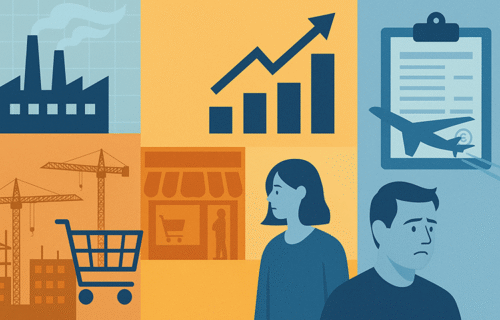Slovakia recorded a mixed confidence climate in November 2025, with business sentiment improving across most sectors while consumer confidence declined to its weakest level since early 2023, according to the latest business and consumer tendency survey from the Statistical Office of the Slovak Republic .
Confidence in industry rose by 2.3 points to –8, supported mainly by more positive expectations for production over the coming three months. Despite this improvement, several components weakened. The industrial production trend balance fell sharply by 28 points to 12, driven largely by a downturn in the manufacture of transport equipment. Order levels also deteriorated: overall orders decreased to –25 and foreign orders slipped to –23, with the most notable declines in the chemical industry, textile production, and manufacture of non-metallic products.
Finished goods inventories were slightly lower, reaching –2, though 93% of respondents considered stock levels adequate. Employment expectations strengthened, with the employment balance rising to 4. An increase in hiring is expected mainly in machinery and non-metallic product manufacturing. Price expectations also rose modestly, with the balance moving to 8.
The construction confidence indicator increased slightly by 0.5 points to –2.5, driven by improved expectations for employment. The recent construction activity trend remained unchanged at 22, with 38% of enterprises reporting higher activity over the past three months.
Assessment of the current level of orders worsened by one point to –14, mainly among building construction firms. Employee shortages (33%), financial constraints (29%) and insufficient demand (28%) were cited as the main barriers to growth. Respondents also mentioned legislative changes, price increases, and consolidation measures, including the raised VAT rate of 23% and the transaction tax.
Business confidence in trade increased by one point to 8.3. Retailers assessed recent business activity more favourably, with the activity trend rising to 16. Stock levels decreased marginally but remained seasonally adequate for 93% of respondents.
Expectations for supplier requirements strengthened, reaching 27, particularly in non-specialized retail and specialized household-goods stores. However, expectations for business activity over the next three months weakened, falling to 17, with pessimism most visible among fuel retailers. Employment expectations improved to 12, while expected price developments declined by four points to 24.
The services confidence indicator rose to 8.7, up from –0.3 in October of the previous year. Respondents reported an improvement in business conditions, with the business situation balance increasing by 11 points to 5. Demand over the past three months also strengthened, rising to 8, driven mainly by transportation and storage services.
Expectations for future demand improved significantly, with the balance climbing to 13. Employment expectations softened slightly, falling to 3, as some sectors — particularly transportation and storage — anticipate a decline. Expected service prices decreased to a balance of 9, with the majority of enterprises expecting price stability.
In contrast to business sentiment, consumer confidence deteriorated. The consumer confidence indicator fell by 1.8 points to –24.6, marking the lowest reading since March–April 2023. All components of the index weakened, with households expressing greater concerns about their financial situation, savings outlook, overall economic conditions and unemployment. Consumer sentiment was 4.1 points lower than one year earlier.
Overall economic sentiment improved month-on-month. The Economic Sentiment Indicator (ESI) rose by 4.5 points to 98.1, supported mainly by optimism in services, but also by more positive assessments in industry, trade and construction. Despite the monthly improvement, the ESI remained 7.9 points below the long-term average and was 0.7 points lower than a year earlier.
